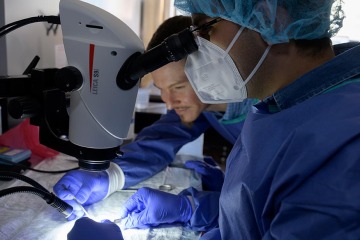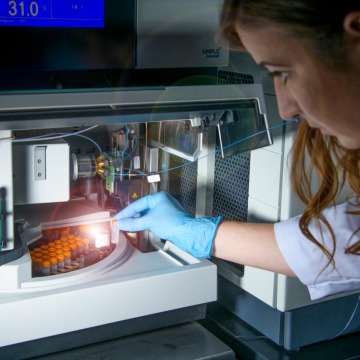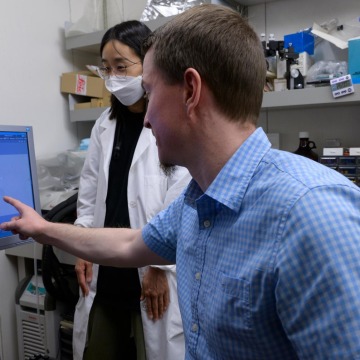Center of Excellence in Addiction Studies
About CEAS
Mission: Assist researchers new to the field of substance abuse research to partner novel ideas about addiction biology in a dynamic and collaborative scientific atmosphere.

One of the most urgent problems in the United States is the steadily increasing numbers of overdose deaths related to opioid use. Opioids are addictive drugs that have a complicated place in society due to their medical use as well as their misuse and abuse. Opioids are appropriately used for the treatment of acute pain resulting from trauma or surgical procedures and for the management of cancer pain.
The use of opioids for chronic, nonmalignant pain, however, is increasingly regarded as a dangerous option with evidence increasingly suggesting that overall harm may outweigh possible benefits for many patients. The duration of exposure to opioids is directly related to the risks of development of addiction. The circuits mediating the addictive and analgesic actions of opioids are largely overlapping. Effective nonaddictive options to treat some types of pain remain a major unmet medical need.
The National Institute on Drug Abuse (NIDA)-funded P30 Core Center of Excellence grant at the University of Arizona supports preclinical research on the intersection of brain circuits mediating addiction and pain to identify molecular mechanisms that can ultimately be targeted to develop therapies for these conditions.
Our goal is to advance research into the underlying brain mechanisms that promote opioid addiction and relapse through the lens of the pain experience. The intersection of pain and addiction could be the source for rational design of pharmaceutical interventions that ameliorate substance abuse disorders and contribute to the resolution of the opioid crisis.
Research Cores




Ongoing Research with CEAS Faculty
The CEAS at the University of Arizona is composed of 8 faculty members from within the Departments of Pharmacology, Psychology and Chemistry/Biochemistry. Our investigators have broad expertise in evaluation of mechanisms that underlie the maladaptation in brain circuits relevant to pain and addiction. Ongoing topics of interest to CEAS investigators includes:
- Intersection of pathways mediating pain, stress and reward
- Role of endogenous opioids in pain and stress
- Descending pain modulatory circuits
- Testing novel compounds at new, and well known, molecular targets
- Behavioral signs of reward.
- Regulation of the reward pathway in the absence and presence of opioids
- In vivo microdialysis and HPLC-MS to measure endogenous cannabinoids
- Novel mechanisms to reduce CNS inflammation and pain
- Neural ensemble activity and dopamine during behavior and sleep
- Cellular analysis of neurotransmitter release in cell lines, to neurons and in vivo.
- Electrical brain stimulation for neural coordination, plasticity, and learning.
- Neural oscillations in learning, memory, disease and aging.
- Electroanalytical methods and software for in vivo analysis of neurotransmitters
- Novel methods to elucidate tonic and phasic dopamine signaling dynamics.
- Development of conducting polymer films for direct biosensing.
- Simultaneous in vivo electrophysiology at electrode arrays with electrochemistry
- New peptide synthesis methods
- Bifunctional peptide agonist and antagonist probes
- Efficient methodologies for improvement of bioactivity and bioavailability
- Ligands to overcome multi-variable pain and pathological plasticity
- Combined opioid/neurokinin pharmacology to reduce opioid reward
- Physiology underlying craniofacial and cancer induced bone pain
- Sex dependent hormonal modulation of pain
- Antinociceptive and pronociceptive mu and kappa opioid circuits
- Mesolimbic and cortical circuits encoding pain aversiveness
- Cellular regulation of opioid receptors and drug discovery
- CRF regulation of VTA dopamine neurons
- Relapse to drug seeking
Partnering with CEAS
We offer opportunities for investigators at the University of Arizona and other universities in the Southwest to partner and collaborate. CEAS can assist users in addressing innovative questions about addiction biology.
We are committed to promoting increased diversity in addiction research by recruiting investigators and students from underrepresented populations to engage in addiction research.
A significant impact of the CEAS will be to leverage established funding to develop new research on addiction research. In addition, the impact of funds from the CEAS will be amplified by interactions with the UArizona Health Sciences Comprehensive Pain and Addiction Center.
Contact Us

